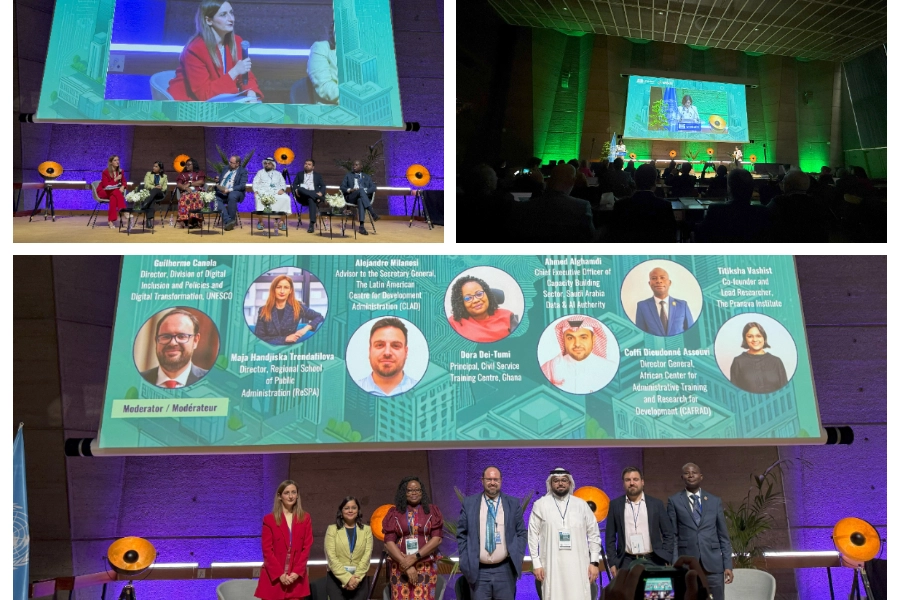
Director Handjiska-Trendafilova Showcases ReSPA’s Digital Transformation Work and Regional Progress at UNESCO Global Conference
4–5 June 2025 | Paris, France
At the UNESCO Conference on Capacity Building on AI and Digital Transformation in the Public Sector, ReSPA Director Maja Handjiska-Trendafilova brought the Western Balkans’ experience in digital governance and public sector innovation to the global stage.
The conference addresses the challenges posed by digital transformation in the public sector, highlighting the unpreparedness caused by insufficient digital competencies among civil servants and substantial obstacles in modernizing services due to legacy frameworks, processes, and policies. Consequently, the initiative aims to enhance effectiveness by promoting targeted capacity-building, including the establishment of a global network of Schools of Public Administration dedicated to digital transformation.
The high-level conference gathered senior policymakers, public sector leaders, academics, and civil society representatives to address the widening digital capacity gap in governments worldwide. Coinciding with World Environment Day on 5 June, the event emphasized sustainable digital transformation and the role of AI and emerging technologies in fostering greener, more resilient governance systems.
Director Handjiska-Trendafilova participated in the opening session titled "Developing National Strategies for Digital Capacity Building", alongside international experts from CLAD, CAFRAD, Ghana’s Civil Service Training Centre, the Saudi Data & AI Authority, and The Pranava Institute. The session explored how to empower public administrations through improved digital literacy, AI competencies, and cross-border cooperation.
“At ReSPA, over 15 years, we've partnered closely with Western Balkan governments to strengthen institutions and build future-ready administrations,” said Director Handjiska-Trendafilova. “Our key lesson is simple: digital transformation is fundamentally about people. Without skilled and motivated civil servants, no technology—no matter how advanced—can truly deliver.” She highlighted how regional cooperation in the Western Balkans has accelerated learning, aligned reform efforts with EU standards, and helped co-develop solutions in areas such as digital identity, interoperability, and cybersecurity.
The Director highlighted:
- The role of Schools of Government as key drivers of digital transformation
- The role of regional cooperation in accelerating reforms and aligning with EU priorities
Success stories from Albania (where AI is supporting EU accession processes) and Serbia’s innovative e-learning on the Fourth Industrial Revolution - ReSPA’s commitment to capacity building - from cyber hygiene to interoperability, AI and open data
- Commitment to Global Digital Cooperation and the establishment of UNESCO’s Alliance of Schools of Public Administration
Throughout the two-day conference, participants examined best practices in digital governance, innovative capacity-building models, and AI integration in public services. Sessions also addressed the financial and institutional frameworks needed to support sustainable digital ecosystems.
The Conference highlights:
- Launch of the SPARK-AI Alliance, uniting Schools of Public Administration to drive research and knowledge-sharing on AI for public service
- Broadband Commission Data Governance Toolkit and AI Tools Radar
- Upcoming MOOC focused on digital transformation in the public sector
A key outcome of the event was its contribution to the WSIS+20 review process and the ongoing Global Digital Compact, both of which aim to establish shared principles for inclusive and rights-based digital development worldwide.
The conference underscored the urgency of equipping public administrations with the digital skills and institutional agility needed to meet 21st-century challenges. It also served as a platform for generating practical solutions, forging new partnerships, and reinforcing a collective commitment to ethical, inclusive, and sustainable digital governance.
“Regional cooperation doesn’t replace national strategies—it strengthens them,” concluded Director Handjiska-Trendafilova. “At ReSPA, we are committed to walking this path with our partners, to ensure that no civil servant—and no citizen—is left behind in the digital era.”



